第76章 CHAPTER X(10)
Then it rose once more in a dreamy and reticent refrain, like the voice of a soul communing with itself in the desert, above the instruments and the murmuring chorus.
"You remember?" whispered the Count.
She moved her head in assent but did not speak. She could not speak.
It was the song the Arab had sung as he turned into the shadow of the palm trees, the song of the freed negroes of Touggourt:
"No one but God and I
Knows what is in my heart."
The priest leaned back in his chair. His dark eyes were cast down, and his thin, sun-browned hands were folded together in a way that suggested prayer. Did this desert song of the black men, children of God like him as their song affirmed, stir his soul to some grave petition that embraced the wants of all humanity?
Androvsky was sitting quite still. He was also looking down and the lids covered his eyes. An expression of pain still lingered on his face, but it was less cruel, no longer tortured, but melancholy. And Domini, as she listened, recalled the strange cry that had risen within her as the Arab disappeared in the sunshine, the cry of the soul in life surrounded by mysteries, by the hands, the footfalls, the voices of hidden things--"What is going to happen to me here?" But that cry had risen in her, found words in her, only when confronted by the desert. Before it had been perhaps hidden in the womb. Only then was it born. And now the days had passed and the nights, and the song brought with it the cry once more, the cry and suddenly something else, another voice that, very far away, seemed to be making answer to it. That answer she could not hear. The words of it were hidden in the womb as, once, the words of her intense question. Only she felt that an answer had been made. The future knew, and had begun to try to tell her. She was on the very edge of knowledge while she listened, but she could not step into the marvellous land.
Presently Count Anteoni spoke to the priest.
"You have heard this song, no doubt, Father?"
Father Roubier shook his head.
"I don't think so, but I can never remember the Arab music"
"Perhaps you dislike it?"
"No, no. It is ugly in a way, but there seems a great deal of meaning in it. In this song especially there is--one might almost call it beauty."
"Wonderful beauty," Domini said in a low voice, still listening to the song.
"The words are beautiful," said the Count, this time addressing himself to Androvsky. "I don't know them all, but they begin like this:
"'The gazelle dies in the water, The fish dies in the air, And I die in the dunes of the desert sand For my love that is deep and sad.'
And when the chorus sounds, as now"--and he made a gesture toward the inner room, in which the low murmur of " Wurra-Wurra" rose again, "the singer reiterates always the same refrain:
"'No one but God and I
Knows what is in my heart.'"
Almost as he spoke the contralto voice began to sing the refrain.
Androvsky turned pale. There were drops of sweat on his forehead. He lifted his glass of wine to his lips and his hand trembled so that some of the wine was spilt upon the tablecloth. And, as once before, Domini felt that what moved her deeply moved him even more deeply, whether in the same way or differently she could not tell. The image of the taper and the torch recurred to her mind. She saw Androvsky with fire round about him. The violence of this man surely resembled the violence of Africa. There was something terrible about it, yet also something noble, for it suggested a male power, which might make for either good or evil, but which had nothing to do with littleness.
For a moment Count Anteoni and the priest were dwarfed, as if they had come into the presence of a giant.
The Arabs handed round fruit. And now the song died softly away. Only the instruments went on playing. The distant tomtom was surely the beating of that heart into whose mysteries no other human heart could look. Its reiterated and dim throbbing affected Domini almost terribly. She was relieved, yet regretful, when at length it ceased.
"Shall we go into the ante-room?" the Count said. "Coffee will be brought there."
"Oh, but--don't let us see them!" Domini exclaimed.
"The musicians?"
She nodded.
"You would rather not hear any more music?"
"If you don't mind!"
He gave an order in Arabic. One of the servants slipped away and returned almost immediately.
"Now we can go," the Count said. "They have vanished."
The priest sighed. It was evident that the music had moved him too. As they got up he said:
"Yes, there was beauty in that song and something more. Some of these desert poets can teach us to think."
"A dangerous lesson, perhaps," said the Count. "What do you say, Monsieur Androvsky?"
Androvsky was on his feet. His eyes were turned toward the door through which the sound of the music had come.
"I!" he answered. "I--Monsieur, I am afraid that to me this music means very little. I cannot judge of it."
"But the words?" asked the Count with a certain pressure.
"They do not seem to me to suggest much more than the music."
The Count said no more. As she went into the outer room Domini felt angry, as she had felt angry in the garden at Sidi-Zerzour when Androvsky said:
"These native women do not interest me. I see nothing attractive in them."
For now, as then, she knew that he had lied.